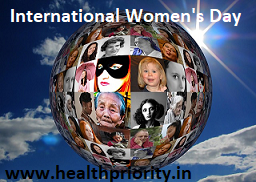Why Do We Celebrate "International Women's Day"?
International Women's Day is celebrated globally on 8th March to recognize and honor the achievements and contributions of women throughout history. It is also a day to raise awareness about the ongoing struggles and challenges that women face, advocate for gender equality, and promote women's rights. This celebration also highlight the social, economic, cultural, and political achievements of women, as well as to call attention to the areas where progress is still needed.
 |
| Top 10 Health Issues Almost All Women Face And Their Solutions |
Theme Of "International Women's Day 2024"
The Theme of International Women's Day 2024 is "Invest in Women: Accelerate Progress"
The celebration of International Women's Day has its roots in the early 20th century women's labor movement and has evolved into a global day of recognition and action for women's rights. While progress has been made, the day also serves as a reminder that there is still work to be done to achieve full gender equality.
Top 10 Health Issues That Almost All Women Face And Their Solutions
Women's health is a multifaceted and evolving landscape, encompassing a range of physical, mental, and social dimensions. Despite significant progress in healthcare, women still face unique health challenges that require attention, awareness, and proactive measures. In this blog, we'll delve into the top 10 health issues affecting women today and explore empowering solutions for a healthier, more resilient future.
 |
| Top 10 Health Issues Almost All Women Face And Their Solutions |
Reproductive Health:
Reproductive health remains a central concern for women. Issues such as menstrual health, fertility, family planning, and access to quality maternal care impact women across the lifespan. Promoting education, destigmatizing conversations around reproductive health, and ensuring access to reproductive healthcare services are crucial steps towards addressing these concerns.
Gynecological Cancers:
Cancers affecting the female reproductive system, including ovarian, cervical, and uterine cancers, present significant health challenges. Regular screenings, vaccinations (e.g., HPV vaccine), and awareness campaigns are pivotal in prevention and early detection.
Sexual and Reproductive Rights:
Access to comprehensive sexual and reproductive healthcare, including contraception and safe abortion services, remains a global concern. Advocacy for women's rights and policies that support reproductive autonomy are crucial components of ensuring women's health and well-being.
 |
| Top 10 Health Issues Almost All Women Face And Their Solutions |
Aging and Menopause:
Navigating the aging process and menopause presents unique health challenges for women. Hormonal changes, bone density loss, and increased risk of chronic conditions require tailored healthcare strategies. Empowering women with knowledge about healthy aging practices is key.
Gender-Based Violence:
Gender-based violence, including domestic violence and sexual assault, takes a toll on women's physical and mental health. Advocacy for prevention, support services, and legal measures are essential to addressing and eradicating this pervasive issue.
Breast Health:
Breast health is a critical aspect of overall well-being for women. Breast cancer remains one of the most prevalent cancers worldwide. Regular self-examinations, clinical screenings, and breast health awareness campaigns play a pivotal role in early detection and successful treatment.
Mental Health:
The intersection of gender and mental health is complex, with women facing unique stressors and challenges. Anxiety, depression, and eating disorders disproportionately affect women. Raising awareness, reducing stigma, and fostering supportive environments can contribute to improved mental health outcomes.
 |
| Top 10 Health Issues Almost All Women Face And Their Solutions |
Cardiovascular Health:
Heart disease is the leading cause of death for women globally, often underestimated due to misconceptions that it primarily affects men. Lifestyle factors, genetics, and hormonal changes contribute to women's cardiovascular health risks. Prioritizing heart-healthy habits, regular screenings, and early intervention are essential.
Osteoporosis and Bone Health:
Women are more susceptible to osteoporosis, a condition characterized by weakened bones. Adequate calcium intake, vitamin D, regular exercise, and bone density screenings contribute to maintaining strong and healthy bones.
Autoimmune Disorders:
Many autoimmune diseases, such as lupus, rheumatoid arthritis, and multiple sclerosis, disproportionately affect women. Research into understanding these conditions and developing effective treatments is ongoing. Advocacy for increased awareness, research funding, and patient support is crucial.
Addressing women's health issues requires a holistic and inclusive approach, involving individuals, communities, healthcare providers, and policymakers. By fostering awareness, advocating for women's rights, and promoting equitable access to healthcare, we can collectively work towards a future where women can thrive in every aspect of their lives. Empowered women contribute not only to their well-being but to the well-being of communities and societies at large.

ConversionConversion EmoticonEmoticon